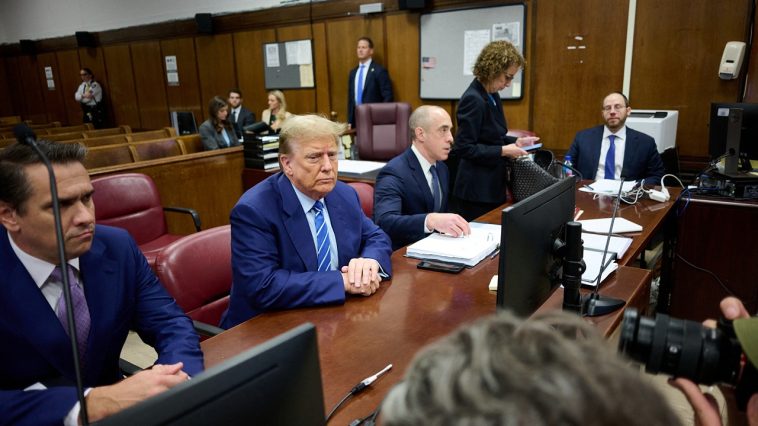The Manhattan legal proceedings surrounding ex-President Trump are underway as jury recruitment commences for the second day. Many had hoped that the judiciary would be impartial, but on the first selection day we witnessed half of the intended jurors being exempted due to their inability to remain unbiased towards the Republican contender.
The proceedings are set to commence again for the second day of Trump’s trial at 9:30 am. This follows a series of charges levelled against him by Manhattan District Attorney Alvin Bragg, consisting of 34 accusations of fraudulently doctoring business records. These allegations are tied to supposed covert payments made during the lead-up to the 2016 Presidential race. Trump, however, categorically denied these charges last year.
In order to scrutinize the capabilities of likely jurors, a 42-question survey was distributed that examined factors such as the individuals’ employment history, political biases, and news media preferences. However, over half of the original pool of 96 potential jurors were promptly dismissed since they confessed their inability to remain detached during the proceedings.
Several others were also dismissed due to variegated issues. The presiding judge over this case, New York Judge Juan Merchan, has, however, continued in his role despite Trump’s request for his recusal. The request was based on perceived prejudice against the former president and Merchan’s own daughter’s affiliations with Democratic politicians.
Judge Merchan dismissed any plea for his recusal, stating there was ‘no foundation’ to warrant it. He also directly addressed Trump, notifying him of his right to be present daily at court to aid his defense. The message was clear: Trump could participate, but cause any disruption and there would be severe repercussions.
Indeed, Merchan cautioned Trump about disrupting the hearing in any shape or form, warning him that this could lead to a contempt citation, and even removal from court. He also stated that if Trump fails to appear when required, an arrest warrant could potentially be issued.
The prediction for the trial length is presently about six weeks. There won’t be any sessions on Wednesdays and proceedings will also skip Monday, April 29. Following the exclusion of jurors for the day, a request from the defense for Trump to skip proceedings next Thursday for Supreme Court arguments was rejected.
It’s important to note that on April 25 the Supreme Court will ponder over the issue of presidential immunity, particularly in regard to Trump’s own immunity from prosecutorial action in relation to alleged electoral interference. The message from Merchan was clear: ‘I will anticipate his presence here the following week.’
Trump had also previously asked to be present at his son Barron’s high school graduation, scheduled for May 17. It is yet undecided whether the former president will be allowed to attend this family event in the midst of this ongoing legal process.
Meanwhile, a gag order was imposed on Trump last month due to his ‘prior extrajudicial statements.’ This order demands that Trump abstain from making or instructing others to make public remarks about any aspect of the case and its proceedings; from the prospective or chosen jurors to the attorneys involved, court staff, and their families.
Prosecutors from Bragg’s office argued during the court proceedings on Monday that Trump had defied this gag order on social media on three different occasions. They suggest a fine of $1,000 for each alleged infraction, totalling a $3,000 fine.
While prosecutors contend that Trump violated the gag order with his social media posts, the defense argued that these posts did not breach the requirements of the order. Merchan said he will determine whether Trump has in fact violated his gag order on April 23 at 9:30 am.
The original charges led by Bragg against Trump last April consist of 34 counts of falsifying business records. The allegations pertain to supposed hush money payments dated back to the 2016 presidential campaign. Bragg claimed that ‘Trump repeatedly and fraudulently manipulated New York business records to hide criminal activity that kept damaging information from voters during the 2016 presidential election.’
Under New York state law, the charges suggest that the defendant, Trump, manipulated business records with a fraudulent intent, potentially with an intention to commit a further crime. However, it’s worth noting that in 2019, federal prosecutors from the Southern District of New York conducted an investigation into the issue and decided not to charge Trump concerning the alleged payments. Similarly, the allegations were dismissed by the Federal Election Commission in 2021.


